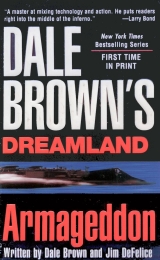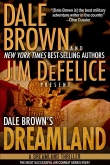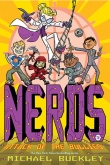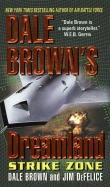
Текст книги "Armageddon"
Автор книги: Dale Brown
Жанр:
Боевики
сообщить о нарушении
Текущая страница: 2 (всего у книги 20 страниц)
“Jeff! Jeff!”
It was him. He-started to swim for the boat, but he was moving in slow motion, not swimming as strongly as he normally did. She maneuvered to the left and right, but couldn’t quite get close enough on the first pass and still didn’t dare to turn off the motor.
“I’ll circle around. Grab on!” she called. “This is as slow as I can go “
Breanna pushed against the throttle switch on the engine, managing to slow the speed a little more but still not entirely cut it as she came around. Zen grabbed the side of the boat, clamping his arms against it like a hobo pulling himself onto the side of a freight car.
“What are you doing?” he yelled as she pushed at the throttle, trying to get it to increase speed gently. “Let me get in for cryin’ out loud,” said Zen, pulling up against the side.
“Wait,” she told him, fighting to keep the boat balanced and moving in the right direction as the engine began churning the water faster.
“They’re going away,” Zen told her. “It’s all right.”
“It’s all right,” she repeated, not quite ready to believe it.
Brunei International Airport, military section
1830
Mack Smith looked at his watch again and shook his head. Everyone in the damn country ran at least a half-hour late.
It was bad enough that his pilots were cavalier about reporting on time, but now even Breanna had caught the bug.
Mack paced in front of the A-37B Dragonfly he was supposed to fly for the night exercise. He was so short of trained pilots that he had to take the plane up himself. It wasn’t that he didn’t want to—Mack loved to fly the old Cessna, which was similar to the T-37 “Tweet” air force pilots cut their teeth on—but the fact of the matter was, as head of the air force, he should at least have had the option of assigning someone to go in his place, just in case he wanted to party or kick back a bit. He currently had only five other pilots with suitable ratings and training to fly jet aircraft, and he was training them all to handle the Megafortress as well as his four A-37Bs. Besides getting these guys up to speed, he needed to at least triple his stable of jocks before the two other Megafortresses arrived.
Hence the importance of tonight’s session.
Stinking Breanna. Where was she?
Come to think of it, he didn’t spend any time partying anymore. There was just too much to do to get this tin can air force in shape. New planes, pilots, ground people—he had a few kids who could strip a jet engine with their eyes shut and get it back together, but he needed more, more, more.
“Excuse me, Minister.”
Mack turned to find one of his maintenance officers, a friendly but sad-sacked sort named Major Brown, who was descended from a nineteenth century British regent or some such thing.
“You can just call me Mack. You don’t need to use my title,” Mack told him for the hundredth time.
Brown’s attempt at a smile looked more forlorn than his frown.
“We have only a week’s worth of fuel supply left, sir. You asked me to bring it to your attention.”
“Did you put through that requisition or whatever the paperwork was?”
“Yes, sir.”
“Did we get it?”
“No, sir.” Brown explained that simply forwarding a form into the morass that was the Brunei defensive forces purchasing system was hardly enough to elicit a yawn, let alone needed fuel supplies. Mack had heard some variation of this lecture three times a day since taking this job nearly a month ago.
“I want you to go over there tomorrow and baby-sit the damn request,” said Mack. “We need a ninety-day supply of fuel at a bare minimum.”
“Where?”
“Wherever you have to go. No—bypass the stinking bureaucracy. Go to the central defense ministry office and tell the chief of staff I sent you.”
Brown blanched. Things in the kingdom of Brunei were done by strict protocol. A mere major, or even a general of insufficient breeding, did not talk to the chief of staff, who like most people of importance was related to the sultan.
“All right,” said Mack, recognizing the look. “What do you suggest?”
“If I go to the finance office, perhaps I can get an expeditious result.”
Two weeks ago, Mack would have asked why Brown would have to go to the finance office to get something as simple as a fuel order sent up the line. Now he knew that the explanation would not clarify anything.
“Do your best,” he told Brown. “We’re all set for the exercise, right?”
“An hour ago, sir.”
“You’re a good man, Brown,” said Mack. “Do your best on the fuel thing.”
“Perhaps if you spoke to the chief of staff yourself.”
“I intend on kicking his butt if I ever see it,” said Mack under his breath.
While Mack and Brown had been talking, two other members of Mack’s staff had approached. One was his administrative assistant, Suzanne Souzou, who had a thick wad of folders in her hand. The other was his director of operations, a Brunei of Chinese extraction named Han Chou.
“Miss Souzou first,” said Mack. He smiled at Han, who was offended by the fact that a woman was given priority. “Beauty before brains.”
“You need to sign these,” said his secretary. “The interviews are set up.”
“Which interviews?”
“The contract people to fill your temporary positions?”
“Yeah, okay. Right. Good.”
“You will need to sign these or the men won’t get paid.”
Mack flipped through the folders; it would take him more than an hour to sign them all. He’d tried telling her two weeks ago to sign for him, but that, too, was a major breach of Brunei etiquette.
“All right. I’ll leave them on your desk first thing in the morning. Good night.”
Souzou flashed a big smile before turning and heading back to the car that had brought her. Mack admired her walking style before turning to Han, who bowed stiffly and handed him an envelope.
“Uh, I don’t get it,” said Mack, taking the envelope. Han said nothing.
“This isn’t a resignation, is it?”
Han still refused to speak.
“Yo, Han, my man. My main man—you can’t leave. We’re just getting going. Come on. We’re going places, my friend. Going places.”
It was debatable whether Mack’s attempt at camaraderie would have worked in the States, where someone at least would have understood the expressions he was using. The only effect it had on Han was to confuse him. Mack opened the letter reluctantly.
“You’re really leaving me?”
Han’s English was heavily accented, but Mack got the gist of it. The new regime—Minister Mack—had brought too much change.
Mack waved his hand. “You’re free,” he told him. “Go. Hit the road.”
Han bowed again. Mack simply shook his head. He was now down to four legitimate pilots, plus himself.
Breanna’s SUV appeared at the far end of the road, heading toward him. Mack waited with his hands on his hips, frowning as he saw that Zen was sitting in the front seat beside her. He’d shown up unannounced yesterday, but Breanna had insisted his visit wouldn’t interfere with the training schedule.
“Captain,” he said as she rolled down the window. “We’re running a little late.”
“I’m sorry,” said Breanna. “We were detained.”
“I’ll bet,” he said, interpreting her words as a euphemism for sex.
“We were at the police ministry,” she said. “We tried calling you”
“Police ministry? What’d you do? Get nailed for speeding?”
Mack listened, dumbfounded, as Breanna explained what had happened that afternoon on the beach. It seemed farfetched. People here left their doors unlocked and keys in their cars.
“This for real, Bree?” he asked.
“Bet your ass it was real,” growled Zen from the other side. “Who were these jokers?”
“Police weren’t sure,” said Breanna. “Possibly guerillas from Malaysia trying to kidnap tourists. There are Muslim extremists trying to take over the Malaysian part of the island.”
“Not on that beach. That’s the prince’s beach,” said Mack. “Maybe they missed the sign,” said Zen.
“Maybe they were trying to get the prince,” said Mack. “Police said that was impossible,” said Breanna.
“That’s because they don’t think it’s possible,” said Mack. “They don’t think that way—they don’t think like you and me.”
“Listen, about the exercise tonight, we’re going to have to call it off,” said Breanna. “The State Department wants to interview me.”
“What?” said Mack.
“They asked me to go over to see one of their intelligence people for a debriefing. I told them fine”
“Well, sure, after the exercise.”
Breanna shook her head. “Sorry. We’re already late. And I haven’t had anything to eat, either.”
Mack had enough experience with Breanna to know it was useless to argue. “How about tomorrow night?”
“Fine,” said Breanna.
“Oh wait, I can’t do it tomorrow night. I have some dinner with the prince.”
“Blow it off,” said Zen sardonically.
Mack pretended he didn’t hear. “How about early the next morning, just before dawn? Say four or five?”
“Dawn?”
“Yeah, that would work,” said Mack. “What do you think?”
“I don’t know.”
“Come on, Bree. You owe me”
“Owe you? How?”
“I got you that beach,” said Mack.
“Oh there’s a debt to be repaid,” said Zen.
“I’ll do it. We’ll set it up tomorrow,” said Breanna.
“Great,” said Mack. “Just great.”
Washington, D.C.
6 October 1997 (7 October Brunei), 0743
“Hey, Colonel:’ said Jed Barclay, pulling up in front of the suburban motel where Lieutenant Colonel Tecumseh “Dog” Bastian had been waiting. “Sony I’m running a little late.”
“It’s okay,” said Dog, aware that his voice probably suggested the opposite.
“Want to grab a coffee?” asked Barclay.
“I had breakfast”
“Yes, sir.”
Barclay pulled out into the traffic. Though he looked like he belonged in college—if that—Jed was the National Security Council’s assistant director for technology and the right-hand man for national security advisor Philip Freeman. He was the unofficial go-between used by the president and the NSC for directing Dreamland’s “Whiplash” operations, and just about Dog’s only real ally in Washington. The colonel felt bad about snapping at him, but he was in a foul mood; his daughter and son-in-law had been involved in some sort of incident in Brunei, of all places. While they were fine, the call he’d gotten a few hours ago about it had cost him the last sliver of sleep he’d been counting on before this morning’s meeting with the president. Brunei and Washington were exactly twelve hours apart; when it was day there it was night here, and vice versa.
“Hotel okay?” asked Jed.
“Fine. Listen, I didn’t mean to bark at you there. I just don’t want to be late for the meeting.”
“Well, we won’t be,” said Jed. “I got a heads-up. The president is running behind.”
“I thought I was his first appointment.”
“You were. But they slid in some domestic stuff and the chief of staff called last night to slide back the appointment. We’re not on until nine-thirty. And given the way things usually go …”
Dog curled his hands in front of his chest. The president was the president, and you waited for him, not the other way around. And surely there were many important things on his plate.
But this wasn’t a good sign.
“I didn’t have time for breakfast myself,” added Jed.
“Let’s get something then,” said Dog, acceding.
Jed described the restaurant as a “coffee place,” but if that was true, it was the fanciest coffee place Dog had ever been in. A hostess greeted them and escorted them across a thick, plush carpet to a table covered with three layers of thick linens. Dog recognized two senators and one of the aides to the vice president at different tables along the way.
“The NSC’ll pay, don’t worry,” said Jed before Dog opened the thick, leather-bound menu.
That prepared him, somewhat, for the prices. Dog told the waitress he just wanted coffee. She nodded, men turned to Jed. “Feta omelet. Light toast. Right?” she asked.
Jed nodded.
“You come here a lot?” said Dog.
“Uh, Mr. Freeman does. And so, because of that, I do.”
“He’s going to drop in on us?”
“He might,” admitted Jed.
“You might have warned me,” said Dog, finally understanding that Jed’s delays and hunger were part of a prearranged plan.
“I am warning you,” said Jed. He closed his mouth as the waitress approached, not continuing until she left. “Look, the president has already made up his mind on Brunei.”
“Brunei doesn’t need a fleet of fighter jets. Or Megafortresses, for that matter,” said Dog.
“The president isn’t going to reverse the Megafortress decision, Colonel. Not even for you. The two other planes are to go to Brunei as soon as they’re ready.”
“With Flighthawks?”
The Flighthawks, or U/MF-3s, were among Dreamland’s most prized possessions. “U/MF” stood for “unmanned fighters.” The Flighthawks were highly capable interceptors, typically launched from the wings of the Megafortress and used for a variety of tasks, from defending the big plane to attacking ground targets. About the size of a Miata sports car, they could go nearly the speed of sound and could be controlled up to twenty miles from the mother ship.
“That’s still to be decided,” said Jed.
“We have to protect our technology, Jed.”
“I don’t disagree. But it’s not my call.”
“You’re not in favor of any of this, are you? Rewarding their cooperation in dealing with China is one thing, but giving our technology away to countries that don’t need it and have their own agendas—”
“They are allies.”
“For now.”
“It’s not my call,” said Jed. “I think we’ll hold the line on the Flighthawks. And probably the F-15s. But they do have a legitimate need for surveillance aircraft, and for more modern fighters. And they’ll buy from the Russians if not us.”
“Did you try pushing LADS?” asked Dog. “They could buy that system with the money they’ll spend on jet fuel for one Megafortress over the course of a year.”
“I did. State did, too. Very hard”
“That’s what they need. It’s low-cost, and we could work with them. It’d be useful to us as well. Let them keep the one Megafortress for sea patrols, and use LADS to guard the kingdom’s borders.”
“Blimps aren’t sexy,” said Jed. “However much they make sense.”
Dog frowned, but he couldn’t argue. LADS stood for Lighter-than-Air Defensive Surveillance system, and at its heart it was simply a blimp—or more accurately, a network of blimps. Outfitted with millimeter and phased array radar as well as infrared and optical sensors, the small airships could be posted over the ocean and kept on station for weeks for about the cost of a Megafortress sortie. The system was scaleable—in other words, blimps could be added almost indefinitely, increasing the area to be covered without overly taxing the system. (The theoretical limit of inputs for the present system was 164°, far above the practical limitations that would be imposed by the coverage area itself.) The blimps could be pre-positioned to cordon off a patrol area several hundred miles wide, or deployed ahead of a mission team.
While LADS had several Dreamland-style features that made it unique, including technology that made its vehicles nearly invisible to the naked eye, it was only one of a number of lighter-than-air systems being developed by the U.S. military and defense contractors. Airships could handle tasks from cargo transport to geostationary surveillance. Relatively inexpensive and extremely dependable, the old technology had a bright future, except for one thing: blimps weren’t sexy.
“I was thinking I might suggest F/A-18s if we turn down the F-15s,” added Jed. “A package similar to Malaysia’s.”
“It’s still overkill for their needs. What about selling them more A-37s?” asked Dog. “Very versatile and reliable aircraft. Perfect for their needs.”
“They’re pushing hard, and they have friends in Congress,” said Jed. “Assuming we can stop the F-15s and the Flighthawks, do you think F/A-18s are too much?”
“A dozen F/A-18s, along with three Megafortresses, would make them a pretty potent power,” said Dog. “They could threaten Malaysia and Indonesia”
“Malaysia has F/A-18s and MiG-29s already,” said Jed.
“But they’re on the peninsula, more than a thousand miles away. Indonesia’s forces are also too far to threaten Brunei. Besides, they’re all allies.”
“We want a counterbalance to the Chinese, and we have to reward the sultan,” said Jed. “Those are the real issues.”
“That sounds a lot like your boss talking, Jed.”
Jed glanced up, then held his coffee cup out for a refill as the waitress approached. Dog, sensing it was going to be a long morning, slid his over for a refill as well.
* * *
“TECUMSEH, GET IN HERE!”
The walls practically shook with the president’s loud greeting. Dog followed Jed and NSC advisor Freeman into the Oval Office, doing his best to guard against the schoolboy awe he inevitably felt upon meeting the president. He’d met Kevin Martindale twice since he’d been elected, and talked to him on average at least three times a month. But this did nothing to lessen the slightly giddy sensation he felt in the presence of the President of the United States.
Call it a by-product of military training, old-fashioned patriotism, or a side effect of his deep appreciation of the country’s history, but Dog still felt honored—deeply honored—to shake the president’s hand. He even blushed slightly as the president praised him in front of Arthur Chastain, the secretary of defense, and National Security Advisor Freeman.
“What you did in China makes you a hero ten times over,” said President Martindale. “And everyone in the world knows it. A million people are alive today because of you, Tecumseh. We won’t forget it.”
“Yes, sir.”
“I have some good news. The Pentagon has worked things out with the bean counters. The Megafortress program, the Unmanned Bomber Program, and the airborne laser arrays will all be funded. As will the next generation Flighthawk program.”
“That is good news,” said Dog, who hadn’t expected all of the programs to survive.
“You’ll have to nip and tuck here and there,” added the president, “but Arthur will help you on that. Won’t you, Mr. Secretary?”
“Yes, sir, of course” The defense secretary smiled at him for the first time ever.
“You’re here to tell me Brunei shouldn’t have Megafortresses and F-15s,” said Martindale. “You’re mad about it, and you wanted to talk to me in person before the deal is finalized.”
“Mad would be not the right word, sir,” said Dog.
“But you don’t approve.”
“I just feel that giving Brunei—giving anyone—our technology, is a problem.”
“Let’s stop right there,” said Freeman, the national security advisor. “Because number one, we’re not giving them anything. They’re paying for the privilege. And that payment is going to help us develop the next generation of weapons and aircraft at Dreamland. It’s one reason we can go ahead with your work there.”
“A small reason,” objected Defense Secretary Chastain.
“We’re not giving them our most advanced technology,” said Freeman. “The basic structure of the EB-52 is older than I am.”
“But sir, with respect, that’s like saying the basic structure of a newborn is older than its mother,” said Dog. “The Mega-fortresses have been completely rebuilt. Their wings are different, the fuselage is more streamlined and stealthy, the engines, the control surfaces—a B-52 would never have made it that far into China.”
“The Old Dog made it into Russia,” said President Martindale. Years before Dog had joined Dreamland, a B-52 had helped avert war with the Soviet Union with a daring—and officially unauthorized—mission over the heart of Soviet defenses. Immortalized in the press as “The Flight of the Old Dog,” the incident had been every bit as daring—and suicidal—as Bastian’s over China. Martindale had been a governor then, but it was well known that he admired the people who had pulled off the mission; he’d told Dog he kept a copy of the book detailing their exploits on his reading table upstairs in the White House.
“You have reservations about Brunei?” President Martindale asked Dog. “Can they be trusted?”
“It’s a beautiful country,” said Dog. “But it’s not a democracy”
“Give it time,” said Freeman.
“It’s not just that,” said Dog. “If we give them Mega-fortresses and F-15s, then what do we give the Malaysians and Indonesians? They share that island. What about the Philippines?”
“Those countries haven’t asked for EB-52s,” said the national security advisor.
“They will,” said Dog. “What do we tell them? They’re not as important as Brunei? What if they ask for F-22s?”
“They’re not getting F-22s. No one is,” said the president. “They’re not getting F-15s, either. Not F-15Cs, or F-15Es. But if we don’t give them something, they’ll simply buy from the Russians. The world is becoming more complicated, Colonel. Very much more complicated.”
“I appreciate that. I just don’t want my weapons systems making things worse.”
“Neither do I,” said the president. “We’ll have to work hard to see that they aren’t.”
Malay Negara Brunei Darussalam
7 October 1997, (local) 0802
In Zen’s opinion, the official Brunei reaction to the incident on the beach was schizophrenic beyond belief. On the one hand, they clearly didn’t consider it, or didn’t want to consider it, as anything but an isolated and freakish incident.
On the other hand, they considered it an insult to the country, which prided itself on being the perfect host. Because of this, the authorities felt obliged to apologize in person, and therefore Breanna and Zen had been invited to breakfast at the Royal House, an exclusive club used only by very high-ranking government officials just outside of town.
Zen might not have minded it except that he was due to catch a flight home at one o’clock, which meant rather than spending the next few hours alone with his wife he had to sit stiffly through a long and formal breakfast. He even had to wear a civilian jacket and tie, purchased specially for him by the State Department liaison, due to some obscure protocol that he didn’t understand.
“Oh, you look handsome. Stop complaining,” said Breanna.
“I’m sorry, but it really is necessary to present the proper image,” said Brenda Kelly, a state department liaison who had been sent over to help smooth the Stockards past the protocol hazards. It was at least the third time she’d apologized. “And wearing your uniform might have sent the wrong message”
“I wasn’t going to wear my uniform,” said Zen.
“You’ll have to excuse my husband,” said Breanna. “He thinks wearing a clean T-shirt is dressing up.”
“I’m on vacation, Bree. It’s not that advanced a concept.”
“There are elaborate customs here,” said Kelly. “Just as people in Brunei usually eat with their fingers—”
“Only the right hand,” said Breanna in a stage whisper to remind him.
“We have to follow their lead,” finished Kelly.
Zen sighed. It was no use arguing; he was stuck in a tie, without hope for parole.
“So are they going to catch these jokers or what?” asked Zen. “Please don’t ask that when the minister comes,” said Ms. Kelly.
“Why not?”
“It’s insulting, Jeff. Of course they’ll catch them:’ said Breanna.
“They were probably guerillas from across the border,” said Kelly. “Islamic terrorists who want to disrupt the Malaysian government. Brunei itself doesn’t have an insurgent problem. There’s no poverty here. Everyone’s happy.”
Zen thought that was incredibly naive. People didn’t rebel against governments just because they were poor. The people who threw the tea into Boston Harbor weren’t starving.
“I think it was a kidnapping for money,” said Breanna.
“Well they tried to get the wrong people then, obviously,” said Zen. “They could have saved themselves a lot of trouble by looking at our checking account.”
“If they could figure it out,” laughed Bree.
“I think they were going after the royal family,” said Zen. “It was their beach.”
“Oh, my God, I was afraid of this,” said Kelly. She pushed away from the chair and rose.
Zen looked up. The sultan himself had just come into the room. He wore a white Western suit, with no outward sign of his rank, but there was no mistaking his authority; a phalanx of aides followed in his wake, and they were trailed by a dozen soldiers. He strutted confidently across the room—the gait even seemed a bit arrogant, thought Zen, but then if he were absolute ruler of an oil-rich kingdom, he’d be a little arrogant, too.
The sultan smiled at Breanna and Kelly, waving his hands at them to make them sit in their seats. Zen watched him bow to the ladies, then bowed his own head as the sultan looked at him.
“The heroes!” exclaimed the ruler.
Attendants and restaurant staff swept in behind him, one pulling up an oversized chair and others appearing with trays of food. Zen’s coffee was refilled; the ladies were given fresh tea. Breakfast meats and sweets suddenly covered every inch of the table.
“I apologize to you on behalf of the people of Brunei,” said the sultan, looking at Breanna.
“Oh, an apology isn’t necessary,” Bree told him. “It was nothing.”
The sultan shook his head. “These criminals. They are outlaws before the eyes of God.”
“Who were they, exactly?” asked Zen, ignoring the evil-eye glare Kelly shot at him.
“They came over from Malaysia, we believe,” said the sultan, who did not seem offended. “Or they were Chinese criminals. We will catch them.”
“Good,” said Zen.
The sultan turned to Breanna. “You have been training our pilots.”
“Yes. They’re very good students”
“Thank you,” he said, bowing his head. “Your plane is a wonderful aircraft. I hope we will be able to purchase many”
“Maybe you should get more counter-insurgency aircraft, if guerillas are a problem,” said Zen.
The sultan’s expression gave only the slightest hint that the comment was out of line. Kelly, on the other hand, seemed to be having a heart attack.
“We have requested many aircraft to bring ourselves up to present standards,” said the sultan, his tone slightly indulgent. “Fortunately, we ourselves do not have an insurgent problem. We need the aircraft to fulfill our role in ASEAN, the Asian alliance. Beyond that—well, you see for yourself. Everyone is happy here.”
The sultan rose. Kelly jumped up. Zen half expected her to beckon at him to rise out of his chair.
Hey, if the sultan had any real power, maybe Zen would be able to.
“I apologize again, and I hope you will enjoy your stay,” the sultan told Breanna. “Anything that can be done to make you happy, will be done.”
Then he held out his hand for her to kiss his ring. Zen rolled his eyes, but Breanna did it, as did Kelly. Then the sultan, trailed by his entourage, strutted his way out of the room.
“YOU INSULTED HIM,” KELLY SAID WHEN THEY WERE GONE.
“Relax,” Zen told her. “What’s he going to do? Nuke us?”
“Jeff, that’s terrible,” Breanna told her husband. “Really, hon. I know you’re still upset. But cut the guy some slack.”
“Why? He’s the supreme ruler, right? He’s in charge. Who else should take the heat?”
Breanna rolled her eyes. It was always obvious when he was upset—he got even crankier than normal. She turned to Kelly. “I don’t think he really insulted the sultan. And he has a point about the aircraft. Megafortresses are overkill.”
“The sultan was insulted,” said the state department rep. “Believe me, I could tell. You don’t understand this country.”
“I do understand that we almost got killed,” said Zen.
“Weapons procurement is none of your business.”
“I know more about those weapons than the sultan ever will. And I’ll tell you—Brunei doesn’t need them. They do need counter-insurgency aircraft. That’s what you should be selling them. Those people who attacked us yesterday are just the tip of the iceberg, I’ll bet.”
Kelly got up. “Please contact my office if you need anything else. Have a good flight home, Major.”
“You were really rude,” Breanna told him when Kelly was gone.
“Come on. Kelly forgets whose side she’s on.”
“She’s just trying to do her job. And I meant to the sultan. He’s a very nice man. Very charming.”
“Aw, come on, Bree. He’s a dictator. Just because he calls himself sultan, you’re going to let him off?”
“He’s very educated and civilized. He’s a hereditary ruler.”
“So was King George, the guy we kicked out of America two hundred years ago, remember?”
“I forgot your ancestors came over on the Mayflower.”
“It was the Guernsey,” said Zen. He wasn’t joking—his relatives had come over in the 1600s, landing in Virginia.
“It wouldn’t hurt you to be more diplomatic,” she insisted, taking her cup of tea. “You’re going to have to be more diplomatic if you want to make colonel.”
“Why? Your dad doesn’t kiss ass.”
Breanna put her hand out and touched his arm. “Hey,” she said.
“Hey yourself.”
“Let’s not fight.”
“Who’s fighting?”
“Okay.”
“Want me to cancel my flight?”
Breanna looked at him. She did, actually. Not just for this afternoon—for weeks and months. She wanted him to stay here with her, stay in paradise.
Or something less than paradise. As long as they were together.
She’d been scared yesterday, worried what she would do if she found him dead there. Breanna had faced that fear before, but that didn’t make it easier—if anything, it seemed to be getting worse.
She wanted to tell him to stay. But he had a job to do. He was due back at Dreamland for a VIP demonstration.
“I do want you to cancel your flight,” she admitted finally. “But you better not. I’m okay.” She put her hand down on his. “We have some time left. Let’s go back to the hotel.”
“Sounds like a plan,” he said, stroking her fingertips as if they were the soft petals of a flower.
Outside Kota Kinabalu, Malaysia
1400
Sahurah Niu waited outside the hut, trying to clear his mind of all distraction. The mission, so long in the planning, had been an utter failure. The operation—the first launched by their group against Brunei instead of Malaysia, their long-time enemy—had resulted only in their own losses. The corrupt sultan and his puppet government would now prepare themselves against further attacks, and perhaps even work in concert with the Malaysians.
There was no way to take it back now. Regrets were useless. He must face the punishment that awaited him like a man.
An aide emerged from the hut and beckoned to Sahurah. He lowered his head and stepped inside, preparing himself with a silent prayer. His head throbbed, but he sturdied himself against the pain; he would find redemption in punishment, he decided. He would accept his punishment gladly.
The Saudi visitor sat beside the imam, legs crossed on the rug covering the dirt floor. Sahurah had met the Saudi a year before at the training camp in Afghanistan; he was a devout, humble man filled with fire against the Western corruptors and devils, as holy in his way as the imam who had been the spiritual and temporal leader of the movement on Borneo island for more than a decade. Sahurah had seen him arrive yesterday, but it was clear that the Saudi did not recognize him; he said nothing then, and he said nothing now, lowering himself humbly. It was unusual that another witnessed their talks, but perhaps that was intended as part of the punishment. Sahurah bowed his head and waited.








